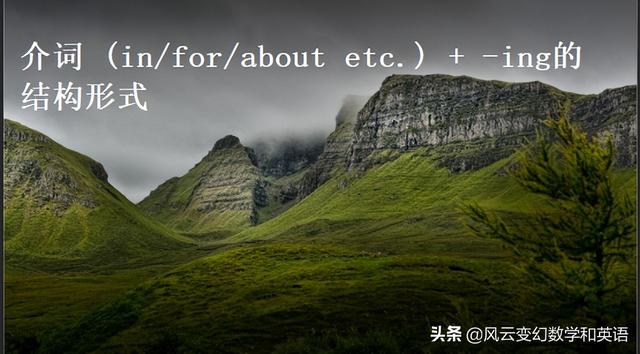介词加动词ing结构(介词in)
介词 (in/for/about etc.) -ing的结构形式

如果(in/for/about etc.) 后面要跟有动词,那么动词要加 -ing:

你可以说‘instead of somebody doing something’, ‘fed up with people doing something’ 等。 :
I’m fed up with people telling me what to do.
我们会说:
to -ing (look forward to doing something etc.)
我们经常使用 to 动词不定式(to do / to see etc.):
We decided to travel by train.
Would you like to meet for lunch tomorrow?
但to也是一个介词(像 in/for/about/with etc.). 例如:
We went from Paris to Geneva.
I prefer tea to coffee.
Are you looking forward to the weekend?
如果我们使用介词 动词, 那么动词就要以-ing结尾:
I’m fed up with travelling by train.
How about going away this weekend?
因此当to是个介词时, 若接动词,则要用动名词形式-ing:
I prefer driving to travelling by train. (not to travel)
Are you looking forward to going on holiday? (not looking forward to go)
before –ing与after -ing:
Before going out, I phoned Sarah. (not Before to go out)
What did you do after leaving school?
你也可以用从句表达‘Before I went out …’ 和 ‘… after you left school’.
by -ing (表达怎样发生的):
You can improve your English by reading more.
She made herself ill by not eating properly.
Many accidents are caused by people driving too fast.
The burglars got into the house by breaking a window and climbing in.
without 这个介词后面跟动词也要用-ing:
We ran ten kilometres without stopping.
It was a stupid thing to say. I said it without thinking.
She needs to work without people disturbing her. or … without being disturbed.
I have enough problems of my own without having to worry about yours.
,免责声明:本文仅代表文章作者的个人观点,与本站无关。其原创性、真实性以及文中陈述文字和内容未经本站证实,对本文以及其中全部或者部分内容文字的真实性、完整性和原创性本站不作任何保证或承诺,请读者仅作参考,并自行核实相关内容。文章投诉邮箱:anhduc.ph@yahoo.com






